The Last Frontier: Heineken in East Africa
Report of a Heineken employee in East Africa
In every corner of the world, one can still indulge a craving for the essence of golden barley with a bottle of cold Heineken beer. This is so in East Africa, one of the ‘last frontiers’, where Niek Vonk, Heineken Area Export Manager, is selling beer to African men and women. He tells Story Terrace about the man of the world, a goat on the roof and fridges in Southern Sudan stuffed to the brim with Heineken.
By Anne Brugts, Content Manager, Story Terrace
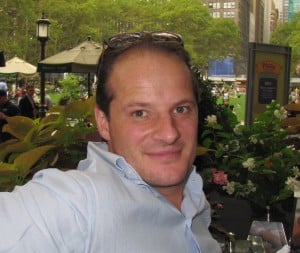 Niek started his Heineken adventure as an intern. ‘I hadn’t finished my studies at the time, but I was ready for an international experience. I was offered an internship in the USA. To start working there in New York – that alone was an amazing experience, but so was the passion, pride and love I started to feel for the company. After that, I finished my studies in Holland and had an interview straight away for a permanent position within Heineken.’
Niek started his Heineken adventure as an intern. ‘I hadn’t finished my studies at the time, but I was ready for an international experience. I was offered an internship in the USA. To start working there in New York – that alone was an amazing experience, but so was the passion, pride and love I started to feel for the company. After that, I finished my studies in Holland and had an interview straight away for a permanent position within Heineken.’
From the Seychelles via Southern Sudan to Somalia
From 2007 until 2011, Niek held various positions in Holland. ‘In my last year in Holland, I met the head of export for Africa. He told me about a project that aimed to focus on the East African market and I immediately said I’d be interested. A few months later I got a phone call to ask if I wanted to join them.’
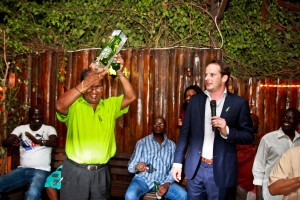 At the moment Niek lives in Kenya. From this home base he is responsible for a series of countries, from the Seychelles via Southern Sudan to Somalia. ‘These areas are very diverse and every country requires a different approach. The infrastructure is a very important aspect of our considerations. For example, Southern Sudan doesn’t have a harbour. That’s a big obstacle for transportation, as you can imagine. Mauritius, on the other hand, is very easy to reach.’
At the moment Niek lives in Kenya. From this home base he is responsible for a series of countries, from the Seychelles via Southern Sudan to Somalia. ‘These areas are very diverse and every country requires a different approach. The infrastructure is a very important aspect of our considerations. For example, Southern Sudan doesn’t have a harbour. That’s a big obstacle for transportation, as you can imagine. Mauritius, on the other hand, is very easy to reach.’
Luckily, a solution emerged. ‘This is the traders’ story. Traders are people that have started to buy and sell Heineken themselves. As a Heineken representative, I would visit places where officially we didn’t yet trade, but still I would find Heineken for sale in the local cafes. The bottles were transported there by these traders, who would sell them alongside their regular baby powder merchandise. Just like that, the Heineken brand started to gain ground without much effort.’
Man of the world
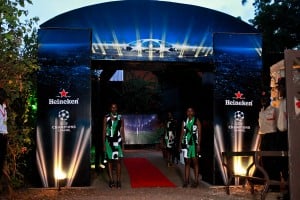 ‘Heineken has been present in Africa for over a hundred years,’ Niek tells us. ‘Especially in northern, southern, western and central Africa they have achieved a firm market share. The whole of Africa is still considered an emerging market, though. In East Africa we had potential, but no firm base. We started investigating a few factors that are significant in branding a product. We investigated demographic developments, political stability and economic development. Those are the three pillars that make for the growth of a middle class. The results suggested East Africa would prove to be a very interesting market. It’s got an enormous population and a growing middle class.’
‘Heineken has been present in Africa for over a hundred years,’ Niek tells us. ‘Especially in northern, southern, western and central Africa they have achieved a firm market share. The whole of Africa is still considered an emerging market, though. In East Africa we had potential, but no firm base. We started investigating a few factors that are significant in branding a product. We investigated demographic developments, political stability and economic development. Those are the three pillars that make for the growth of a middle class. The results suggested East Africa would prove to be a very interesting market. It’s got an enormous population and a growing middle class.’
This middle class is very important for Heineken sales. ‘A middle class will soon acquire an ever-growing spending power. People will want to make a statement about themselves and will therefore develop an interest in brands.’ Heineken has come up with a concept that symbolises this middle class. ‘The Man of the World, we call him – or her. This can be a woman or a man, who lives in a city, has a lot of social obligations, wishes to possess the newest gadgets and wants to travel. He or she wants to identify with certain brands, movie stars, sports heroes, etc.’
James Bond and the Champions League
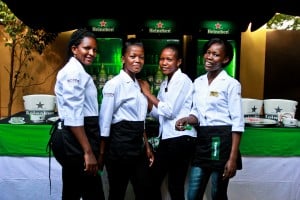 Since Niek carries responsibility for so many areas, he has a lot of different men-of-the-world (MotWs) to keep in mind. ‘The target stays the same, but the man of the world changes per region. Spending power is lower in Southern Sudan than in Kenya, for example. We have to take those facts into consideration.’
Since Niek carries responsibility for so many areas, he has a lot of different men-of-the-world (MotWs) to keep in mind. ‘The target stays the same, but the man of the world changes per region. Spending power is lower in Southern Sudan than in Kenya, for example. We have to take those facts into consideration.’
In creating new marketing strategies the MotW is a central feature. ‘Heineken’s advertising campaigns are less locally focused than before. We now have global campaigns that target global citizens. Therefore worldwide symbols appear in Heineken’s advertisements.’ James Bond is one of them. ‘The adventurist who is still all suited up, that image appeals to the MotW. And the Champions League is a good example of an almost-global football phenomenon with which Heineken is associated as well. As opposed to the local beers, which are associated with the Dutch version of the premier league.’
Flexibility required
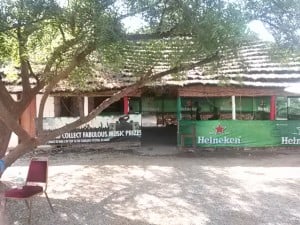 If you work in Africa, you can count on disturbances. ‘Stability is the least applicable description. The attack on Westgate Mall in Nairobi is an example. This mall was located a few hundred metres from our office. We used to go there quite often during lunch, or with our families at the weekends. There were shops, restaurants, a cinema. You found yourself in western spheres there. In September 2013, the terrorist organisation Al Shabaab chose this place for their attack. In the mall, they took a large group of people hostage and lots of them died. After the attack, our world was turned upside down. Holland feels very far away in such times, I can assure you.’
If you work in Africa, you can count on disturbances. ‘Stability is the least applicable description. The attack on Westgate Mall in Nairobi is an example. This mall was located a few hundred metres from our office. We used to go there quite often during lunch, or with our families at the weekends. There were shops, restaurants, a cinema. You found yourself in western spheres there. In September 2013, the terrorist organisation Al Shabaab chose this place for their attack. In the mall, they took a large group of people hostage and lots of them died. After the attack, our world was turned upside down. Holland feels very far away in such times, I can assure you.’
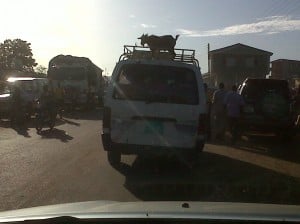 Apart from the political instability that leads to similarly dramatic excesses, you get plenty of wonderful moments when working in Africa. ‘You’ll experience the weirdest events. One day I’ll be in a car with a goat tied to the roof, the next I’ll be in the passenger seat of a Ferrari. That’s the beauty of the diverse places I travel to. And the most special moments are those where you unexpectedly come across Heineken in places where it seems least plausible. For example, I recently found myself in a faraway corner of Southern Sudan. I visited a small village with five bars, all connected to the same electricity generator. But when they opened the fridge, it was stuffed to the brim with Heineken bottles.’
Apart from the political instability that leads to similarly dramatic excesses, you get plenty of wonderful moments when working in Africa. ‘You’ll experience the weirdest events. One day I’ll be in a car with a goat tied to the roof, the next I’ll be in the passenger seat of a Ferrari. That’s the beauty of the diverse places I travel to. And the most special moments are those where you unexpectedly come across Heineken in places where it seems least plausible. For example, I recently found myself in a faraway corner of Southern Sudan. I visited a small village with five bars, all connected to the same electricity generator. But when they opened the fridge, it was stuffed to the brim with Heineken bottles.’
—————
About us: Story Terrace helps customers to capture personal stories in beautiful books alongside a professional writer. Our writers have a range of backgrounds and interests, sharing one passion: Portraying individuals through carefully crafted anecdotes and lively stories.
For more information on having your stories written down, send an e-mail to info@ or get in touch via our contact form.
This month we celebrate 150 years Heineken. Also read our article Heineken in the USA. What does Heineken mean to you?



